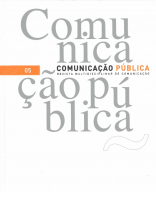Discourse strategies in corporate communication for enhancing democracy
DOI:
https://doi.org/10.4000/cp.8177Palavras-chave:
discourse strategies, participatory decision-making processes, targets as citizens, knowledge transfer, building competenciesResumo
Analyzing Public Relations’ contribution to Democracy and specifically how Corporate Communication can involve publics in participatory decision-making processes, not only PR tools should be investigated but also the discourse strategies applied for attaining this aim.
In democratic settings, addressees have to contribute to developing the social reference system, making choices based on correct information efficiently processed, as well as expressing them patronizing suitable linguistic means.
In this perspective, I want to explore, within a functional linguistic framework, the discursive strategies for:
- activating the targets as citizens and not primarily as customers
- transferring knowledge
- building consensus as well as competencies.
Downloads
Referências
Antos, G. (2005) Die Rolle der Kommunikation bei der Konzeptualisierung von Wissensbegriffen. In: Antos, G./Wichter, S. (eds.) Wissenstransfer durch Sprache als gesellschaftliches Problem. Frankfurt am Main, Peter Lang, pp.339-364.
Bourdieu, P. (1991) Language and Symbolic Power. Cambridge, Polity Press.
Candlin, C.N. (2002) Alterity, Perspective and Mutuality in LSP Research and Practice. In: Gotti, M./Heller, D. & Dossena, M. (eds.) Selected Papers of the 2nd Cerlis Conference. Bern, Peter Lang, pp.21-40.
De Beaugrande, R./Dressler, W. (1981) Einführung in die Textlinguistik. Tübingen, Max Niemeyer.
De Saint-Georges, I. (2004) Materiality in Discourse: The Influence of Space and Layout in Making Meaning. In: Levine, P./Scollon, R. (eds.) Discourse & Technology – multimodal discourse analysis, Washington, D.C., Georgetown University Press, pp.71-87.
Halliday, M.A.K. (1994) An Introduction to Functional Grammar, London, Edward Arnold.
Halliday, M.A.K./Hasan, R. (1976) Cohesion in English. London, Longman.
Halliday, M.A.K./Hasan, R. (1985) Language, Context, and Text: Aspects of Language in a Social-semiotic Perspective. Geelong, Deakin University Press.
Hoey, M. (2001) Textual Interaction. An Introduction to Written Discourse Analysis. London, Routledge.
Jahr, S. (2005) Die Effektivierung des Transfers von Wissen durch die Kommunikation von Emotionen in juristischen Texten. In: Antos, G./Wichter, S. (eds.): Wissenstransfer durch Sprache als gesellschaftliches Problem. Frankfurt am Main, Peter Lang, pp.307-318.
Kress, G./van Leeuwen, T. (1996) Reading Images: The Grammar of Visual Design. London, Routledge.
Martin, J.R./Rose D. (2004) Working with discourse. Meaning beyond the clause. London/New York, Continuum.
Matthiessen, C. (1995) Theme as an enabling resource in ideational 'knowledge' construction. In: Mohsen, G. (ed.) Thematic Development in English Texts. London, Francis Pinter, pp.20-54.
Oeckel, A. (1988) Glaubwürdigkeit contra Angst – Kursbestimmung der Öffentlichkeitsarbeit. In: Schulze-Fürstenow, G. (ed.) PR-Perspektiven. Beiträge zum Selbstverständnis gesellschaftsorientierter Öffentlichkeitsarbeit (PR), Neuwied/Darmstadt, Luchterhand Verlag, pp.13-26.
Poynton, C. (1985) Language and Gender: Making the Difference. Geelong, Deakin University Press.
Ronneberger, F. (1978) Public Relations in politischen Systemen. In: Ronneberger, F. (ed.) Public Relations des politischen Systems. Staat, Kommunen und Verbände, Nürnberger Forschungsbericht Band 2. Nürnberg, Verlag der Nürnberger Forschungsvereinigung, pp.1-21.
Source used:
Henkel, Foreword of its Sustainability Report 2006 http://www.henkelna.com/us/content_data/SustainabilityReport_2006_english.pdf
Publicado
Edição
Secção
Licença
Direitos de Autor (c) 2007 Copyright (c) 2007 Author

Este trabalho encontra-se publicado com a Licença Internacional Creative Commons Atribuição-NãoComercial 4.0.
Os conteúdos da Comunicação Pública estão licenciados com uma licença Creative Commons - Atribuição-NãoComercial 4.0 Internacional.




